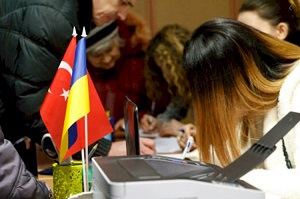A Perspective on Middle Eastern Problems Through the Lens of Bediüzzaman Said Nursi
Bediüzzaman's View on Democratic Progress and Freedom

A Perspective on Middle Eastern Problems Through the Lens of Bediüzzaman Said Nursi
Introduction: Understanding Bediüzzaman in a Time of Transition
YUSUF İNAN / ŞEHİTLER ÖLMEZ / TÜRKİYE
Bediüzzaman Said Nursi (1878–1960) lived during a period of immense social, political, and ideological turmoil. His lifetime spanned the collapse of the Ottoman Empire, the rise of the Turkish Republic, and the global changes wrought by two World Wars. Within Turkey, it was a time of transition from an imperial monarchy to a modern nation-state, from autocracy to constitutionalism, and from tradition to modernity. For the Islamic world, the dissolution of unity and the rise of Western hegemony defined the era, while globally, liberal movements, industrial revolutions, and the growth of multinational organizations reshaped societies.
In this volatile period, Bediüzzaman emerged as a significant figure offering intellectual and spiritual guidance. His works, especially the Risale-i Nur collection, addressed many of the human, social, and spiritual dilemmas of his time. Notably, his thoughts remain relevant today as we seek answers to the enduring problems of the Middle East.
Bediüzzaman's View on Democratic Progress and Freedom
One of Bediüzzaman’s central principles was the promotion of freedom and democracy. He believed that these values were essential for achieving peace and social harmony in the Islamic world. Drawing on the prophetic example, Bediüzzaman emphasized the need for governance based on justice, consultation, and the rule of law, which he equated with the ideals of democracy and constitutional governance.
For Bediüzzaman, genuine democracy, as practiced during the early Islamic period, could lead to social unity and shared prosperity. His call for freedom and justice resonates in today’s Middle East, where many nations struggle with authoritarianism, oppression, and social unrest. Bediüzzaman believed that Islamic principles could coexist with democratic values, creating a governance system that respects both individual freedoms and collective well-being.
Rejecting Racism and Advocating for Islamic Brotherhood
Bediüzzaman strongly opposed racism and nationalism, which he viewed as destructive ideologies foreign to the spirit of Islam. He argued that the true bond between Muslims is their shared faith, not their ethnic or national identities. According to Bediüzzaman, the principle of "iman kardeşliği" (faith-based brotherhood) should unite Muslims across different races and cultures. In the context of Middle Eastern conflicts, where ethnic and sectarian divisions often fuel violence, this idea is particularly significant.
Bediüzzaman’s call for the rejection of racism and the strengthening of brotherhood can offer a framework for resolving ethnic and sectarian tensions in the Middle East. By emphasizing shared Islamic values and the unity of the ummah (Muslim community), his teachings provide an antidote to the divisions that have plagued the region for decades.
Education as the Key to Reviving Civilization
For Bediüzzaman, education was the cornerstone of any lasting reform. He envisioned a comprehensive system of education that combined religious and scientific knowledge, allowing students to engage with both spiritual and worldly matters. His concept of the Medresetü’z-Zehra, a proposed university that would unite students from various backgrounds and disciplines, aimed to bridge the gap between tradition and modernity. This vision of education sought to foster intellectual growth, moral development, and technological advancement simultaneously.
In today’s Middle East, where access to quality education remains a significant challenge, Bediüzzaman’s ideas are highly relevant. Improving education systems, especially by incorporating both modern sciences and ethical teachings, could address many of the region’s socio-economic problems and create a more informed and capable generation.
Economic Development through Entrepreneurship
Bediüzzaman believed that economic progress would come not through reliance on the state but through individual entrepreneurship. He argued that true economic independence could only be achieved if people were encouraged to engage in trade, agriculture, and industry, rather than relying on government jobs or external aid. According to Bediüzzaman, an economy driven by private initiative would lead to sustainable development and collective prosperity.
This insight is crucial for the contemporary Middle East, where economic stagnation and high unemployment rates have led to widespread discontent. Encouraging entrepreneurship and reducing dependency on state-run enterprises could pave the way for more robust and self-sufficient economies.
The Path to Peace: Encouraging Dialogue and Reconciliation
Bediüzzaman also recognized that violence and conflict only serve to deepen divisions and perpetuate suffering. He advocated for a culture of peace, dialogue, and reconciliation, stating that only through understanding and cooperation could lasting peace be achieved. This perspective is especially pertinent in the Middle East, where decades of conflict have devastated communities and economies.
The region’s path to stability, according to Bediüzzaman’s teachings, lies in embracing forgiveness and compromise, as well as prioritizing the collective good over individual or nationalistic ambitions. His emphasis on inter-faith and inter-ethnic cooperation can also provide a model for resolving the region’s many ongoing conflicts.
Conclusion: Bediüzzaman’s Solutions for the Middle East Today
Bediüzzaman Said Nursi’s insights offer a holistic approach to addressing the Middle East's complex challenges. His call for democratic reform, education, economic self-sufficiency, and peaceful reconciliation resonates with the region’s current struggles for freedom, development, and stability. By looking to Bediüzzaman’s teachings, policymakers and intellectuals can find a framework for constructing a more just, prosperous, and unified Middle East.
In the end, Bediüzzaman’s legacy is a reminder that faith, knowledge, and compassion can serve as the foundation for building a better future. His solutions are not bound by time or place but offer a universal blueprint for addressing the enduring problems of the Islamic world.






































